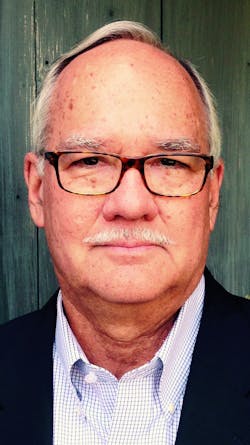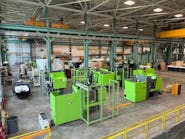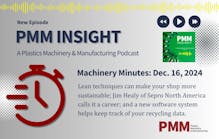I don’t envy Tony Radoszewski, the new president and CEO of the Plastics Industry Association (PLASTICS). He has stepped up to be the face of the plastics industry when it seems like much of the world is trying to spit in the industry’s eye.
Consider this:
• The industry is being pummeled by bad press: Countless national and international news outlets are reporting on the real dangers of plastic pollution.
• Some local curbside recycling programs across the country are being suspended or curtailed, primarily because of poor markets for the material collected.
• Some recycling rates are going in the wrong direction.
• Some highly visible beverage and consumer products companies have left the association under pressure from environmental groups. The groups paint them as not supporting recycling and reduction of plastics use, because the industry has lobbied for state laws that prohibit local bans on plastic packaging.
• Researchers say some of the food we eat now contains plastic.
These all make scary headlines for the plastics industry. Welcome to the new president and CEO!
Radoszewski has two masters to serve. The first is the group composed of dues-paying members of the association. Programs already in place need to be nurtured and new, member-centric programs developed. Serving the members is important, and his 13 years as head of the Plastics Pipe Institute and 40 years of industry experience are great preparation.
More important, he must become a national leader in changing the public’s perception of plastics from a dangerous material to one that makes positive contributions to society.
That will be a challenge. Radoszewski will have to forge alliances, mobilize association members and non-members, and always be ready to set the record straight. Some of those alliances will be with organizations outside the U.S., so his will be an international role.
It is encouraging to see the German government and the VDMA, which represents machinery manufacturers — including those that make plastics processing machinery — go all in on implementing circular economy practices. Some sectors will be more successful than others, but German manufacturers are talking to each other across boundaries. They are also speaking with a unified voice, and the plastics industry could be a big winner in terms of improving public perception.
Where are our bold initiatives that will help the public realize that the industry is acting to solve the problems of plastics? PLASTICS could lead such efforts.
In Israel, a consortium of recyclers, resin manufacturers and academic and research organizations aim “to close the existing technological gap and situate Israel’s plastics industry as a leader in the field of plastic waste management,” according to the Jewish News Service. The consortium has government funding and is one of many in Israel working on problems related to recycling and the use of recycled materials.
You have to admire different sectors coming together to work on a common problem. Someone must organize and lead these initiatives, and PLASTICS is situated to do so.
The unfavorable press coverage that causes us to cringe cannot be changed by simply complaining about news outlets treating the industry unfairly. Too much of what they report is true.
So, what happens if we keep muddling along? Bans on bags, bottles and straws are going to keep popping up, more everyday plastic products are going to go the way of the McDonald’s foam clamshell, rivers and oceans are going to continue to suffer from plastic pollution, and there will never be a national policy to facilitate recycling.
Many Americans have seen so many horrifying stories that they no longer trust plastics. They just don’t have a better solution. Unfortunately, some environmental groups fill these voids with campaigns to substitute one product for another that is no better for the environment when examined closely.
PLASTICS is not a big group, but the time is right for it to speak with a bigger voice and wield all the influence it can muster.
Processing machinery and auxiliary equipment manufacturers have long made up a disproportionate share of total membership, which is only a fraction of what it could be when you consider the entire industry.
With all of these negative pressures on the industry, it is time for those who have been sitting on the sidelines to get in the game. There is a huge group of processors and even some equipment suppliers who should join.
This is a critical time for the industry, and Radoszewski cannot be successful representing us without widespread support. I wish him well.
Ron Shinn, editor
Ron Shinn | Editor
Editor Ron Shinn is a co-founder of Plastics Machinery & Manufacturing and has been covering the plastics industry for more than 35 years. He leads the editorial team, directs coverage and sets the editorial calendar. He also writes features, including the Talking Points column and On the Factory Floor, and covers recycling and sustainability for PMM and Plastics Recycling.






